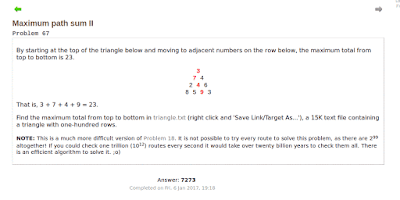Maximum path sum II
By starting at the top of the triangle below and moving to adjacent
numbers on the row below, the maximum total from top to bottom is 23.
Find the maximum total from top to bottom in triangle.txt (right click and 'Save Link/Target As...'), a 15K text file containing a triangle with one-hundred rows.
3
7 4
2 4 6
8 5 9 3
That is, 3 + 7 + 4 + 9 = 23.7 4
2 4 6
8 5 9 3
Find the maximum total from top to bottom in triangle.txt (right click and 'Save Link/Target As...'), a 15K text file containing a triangle with one-hundred rows.
NOTE: This is a much more difficult version of Problem 18. It is not possible to try every route to solve this problem, as there are 299 altogether! If you could check one trillion (1012)
routes every second it would take over twenty billion years to check
them all. There is an efficient algorithm to solve it. ;o)
As already stated in the question, this problem is similar to problem 18. You should solve Problem 18 first and then come back here to solve this problem.
As there are many rows in the given triangle.txt file, I have made a little bit of changes to the problem 18 python script. Unlike problem 18 solution we will open the file using the python file.read() method and everything is as usual.
Have a look at the program and it is very simple.
Program
#http://radiusofcircle.blogspot.com #importing time module import time #time at the start of execution start = time.time() with open('p67triangle.txt') as f: # All the numbers in the file number = f.read() #splitting the number into a list number = number.strip().split('\n') #converting each and every list of strings to int for i in xrange(1,len(number)): number[i] = number[i].strip().split(' ') number[i] = [int(x) for x in number[i]] #adding the first number bcz we could not do the above #operation as this one one number number[0] = [59] #counter for counting number of iterations counter = 0 #for loop for bottom-up approach for i in xrange(len(number)-2,-1,-1): for j in xrange(len(number[i])): number[i][j] = number[i][j] + max(number[i+1][j], number[i+1][j+1]) counter += 1 number.pop() #printing the output print 'Found {} in {} iterations'.format(number[0][0],counter) #time at the end of execution end = time.time() #printing the total time print end-start
You can download the script file from Github Gist 67.py
Output
Summary
As I have already solved Problem 18 using the perfect algorithm, it just took me few seconds to tweak some changes to the script file so that it can be used for this problem. Unlike 299 iterations, our program just iterates 4950 times and gives us the solution. This is less than 1% of iterations which are required when brute force method is used. So, finally I am satisfied with the program.
If you like the solution, or if you have any doubt then comment in the comment box below. I will be glad to help you.
You can also contact me.
Thank you! Have a nice day😋.
If you like the solution, or if you have any doubt then comment in the comment box below. I will be glad to help you.
You can also contact me.
Thank you! Have a nice day😋.

